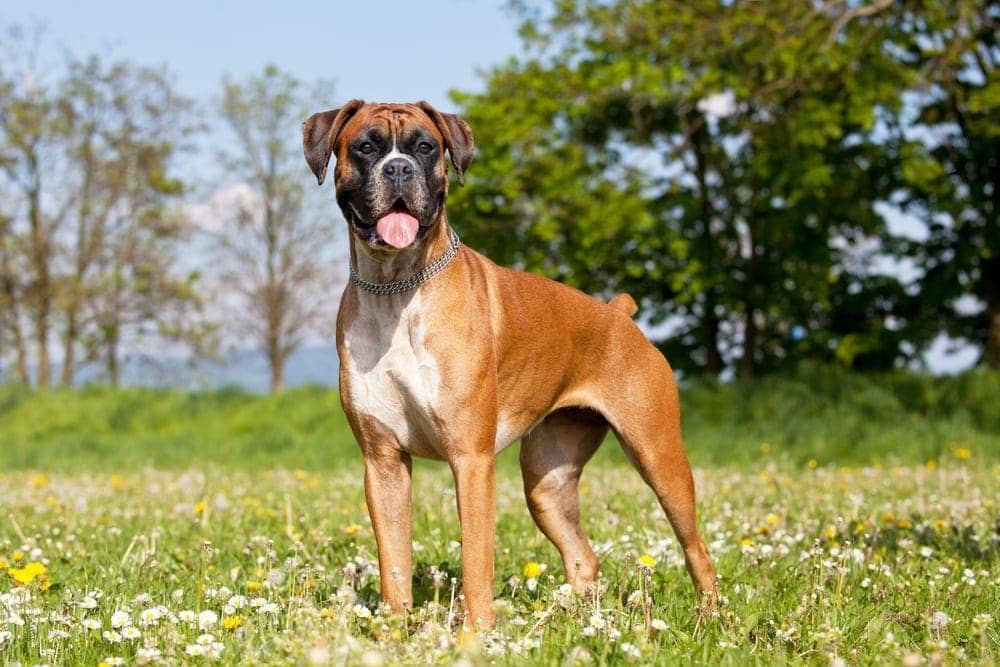7 Dog Breeds Prone to Heart Disease: Vet Reviewed Facts
Updated on

Heart disease is a serious and relatively common problem for dogs. Fortunately, many types of heart disease can be controlled with medication, lifestyle adjustments, and regular monitoring. Knowing what heart issues your dog may be prone to, can help with picking up the signs of disease early. Early diagnosis is important so that the progression of the disease can be slowed before it progresses to heart failure.
Here’s a list of some of the dog breeds that are prone to heart disease:
The 7 Dog Breed Prone to Heart Disease
1. Cavalier King Charles Spaniels

| Type: | Degenerative mitral valve disease (DMVD) |
The Cavalier King Charles Spaniel is a lovely, gentle, even-natured dog but is probably the most likely breed to develop a heart condition.
Practically all of these dogs eventually develop some degree of mitral valve disease. The mitral valve is one of the four heart valves that control blood flow. Degenerative mitral valve disease occurs when the mitral valve becomes thickened and lumpy. This means it cannot shut properly and becomes leaky. The blood leaking is why a heart murmur can be heard with a stethoscope. When it is leaking the heart has to work much harder to pump blood around the dog’s body. This condition gets worse over time and can eventually lead to heart failure.
A responsible breeder will health test breeding parents which should include a cardiac exam.
2. Poodles

| Type: | Degenerative mitral valve disease (DMVD) |
Both miniature and toy Poodles are prone to mitral valve disease. Luckily, these canines aren’t prone to many other diseases. Therefore, they’re often healthy overall and can have a long life expectancy. Smaller Poodles tend to live the longest.
As a progressive disease, it isn’t curable and can get worse but medications can help slow the disease progression and reduce symptoms.
3. Dachshunds

| Type: | Degenerative mitral valve disease (DMVD), patent ductus arteriosus(PDA) |
Dachshunds are playful little dogs but are unfortunately prone to several health conditions including some forms of heart disease. Like the previous two small breed dogs, they can be more prone to mitral valve disease.
Furthermore, this breed is also prone to patent ductus arteriosus, a congenital disease that puppies are born with. They’re about 2.5 times more likely to develop this condition compared with larger dogs, so it is still rare overall.
This condition occurs when a shunt doesn’t close properly between the aorta and the pulmonary artery after birth. The signs depend on the size of the PDA and larger PDAs can show significant signs such as a loud heart murmur, stunted growth, intolerance to exercise, and difficulty breathing. The PDA can be closed with either open heart surgery or a less invasive procedure with a special device deployed inside the PDA via catheters inserted in one of the hind limb arteries.
4. Doberman Pinschers

| Type: | Dilated Cardiomyopathy (DCM) |
Unfortunately, the active Doberman Pinscher is at increased risk of a heart condition called Dilated Cardiomyopathy. This condition is due to a weakness of the heart muscle which means it can’t contract properly. This leads to enlarged heart chambers and then congestive heart failure, irregular heart rhythms and/or sudden death.
The definitive genetic mutation causing DCM in the Doberman ( and Boxer) has now been discovered.
It is important to have regular veterinary exams so your vet can check for a heart murmur or irregular rhythm. Annual specialist screening by a board-certified cardiologist can also be considered.
5. Golden Retrievers

| Type: | Congenital heart disease |
Golden Retrievers have a higher chance of congenital heart disease than other dogs, specifically aortic stenosis. This occurs when the aortic valve doesn’t develop appropriately while the puppy forms. After birth, the narrowed heart valve means the heart has to work harder to pump blood through the aorta. Over time this can cause problems even leading to heart failure.
This defect can be mild and not cause many issues. However, moderate to severe defects are fairly serious and often noticed soon after birth in dogs as big as the Golden Retriever. Milder cases may not be obvious until the dog has aged a bit. Vets can often hear the heart murmur and further tests that are performed to confirm a diagnosis of aortic stenosis, including ECGs and ultrasound examination of the heart.
6. Boxers

| Type: | Arrhythmogenic right ventricular cardiomyopathy (ARVC), aortic stenosis |
The main heart disease seen in Boxers is known as Arrhythmogenic right ventricular cardiomyopathy (ARCV) or “Boxer cardiomyopathy.” This is a genetic condition and is unfortunately common, in one study 50% of boxers were positive for the gene which causes ARVC. In this heart condition, the normal heart muscle is replaced by fibrous or fatty tissue which disrupts the electrical system of the heart usually causing an irregular heartbeat.
The most common signs of ARVC are episodes of collapse or fainting. Current treatment options are largely restricted to the use of oral antiarrhythmic medications. Unfortunately, this condition can also cause sudden death.
Boxers can also suffer from aortic stenosis.
7. Miniature Schnauzers

| Type: | Sick sinus syndrome (SSS) |
The sinus node in the heart is responsible for triggering and initiating the normal heartbeat and establishing the normal heart rate. In dogs with sick sinus syndrome, the sinus node has lapses in discharging, meaning the heart beats too slowly or not at all. As a result, there are long pauses in between heartbeats. The most common signs in dogs with this condition are weakness, lethargy, exercise intolerance, fainting episodes, or collapse.
Often, treatment involves implanting a pacemaker. Veterinarians who specialize in cardiology perform this procedure and a pacemaker is capable of restoring a good quality of life.
Miniature Schnauzers also suffer from mitral valve disease.
Final Thoughts
Any dog can get heart disease but certain breeds are more prone to particular conditions.
Always ask about the health of the parent dogs before adopting a puppy. Especially, If you decide to adopt a puppy from one of the breeds above, make sure the parents have had the relevant heart tests and other health checks. With proper breeding practices, passing on harmful genetics can be avoided. Finding a breeder that puts the dogs’ hearts and health first is important.
Featured Image Credit: Rala3030, Shutterstock













